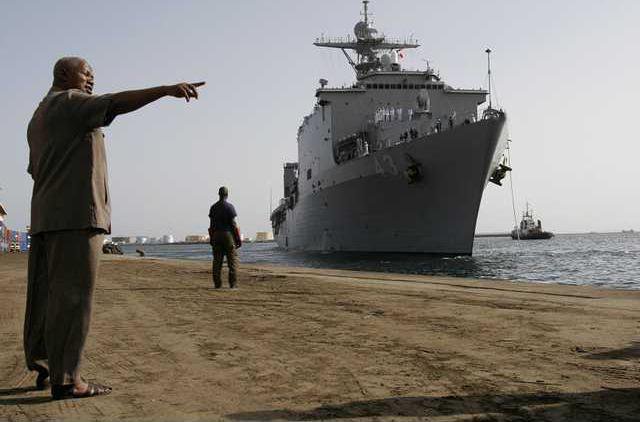DAKAR, Senegal — A new command takes over all U.S. military operations in Africa on Wednesday, a program that many Africans fear has a hidden agenda skewed by the war on terror and a self-interested scramble for resources.
Before Africom was created one year ago, American military programs on the continent had been divvied up among three other commands more concerned with NATO and the wars in Iraq and Afghanistan.
The new command is inheriting responsibility for a Centcom-run base in Djibouti, where 1,800 troops are deployed to keep Horn of Africa terror networks in check. It also takes over European Command’s Trans-Sahara Counterterrorism Initiative and dozens of other military and maritime training programs.
‘‘Africans believe Africom is aimed at promoting America’s interests, not Africa’s,’’ said Wafula Okumu, a Kenyan analyst at South Africa’s Institute for Security Studies. Most Africans don’t trust their own militaries, which in places like Congo have turned weapons on their own people.
‘‘They don’t trust Africom, either, because it’s a military force,’’ Okumu said. There is also ‘‘a suspicion America wants to use us, perhaps make us proxies’’ in the war on terror.
Africom’s deputy for military operations, Vice Adm. Robert T. Moeller, said counterterrorism is a priority, but it is not the only one.
Some key areas of Africa — such as Somalia’s pirated-infested coastline — will still be under the jurisdiction of the U.S. Central Command headed by General David Petraeus.
International warships now patrol waters off the Somali coast and have created a special security corridor under a U.S.-led initiative, but attacks have not abated. In all, 62 ships have been attacked in the notorious African waters this year.
‘‘We abhor the actions of the pirates. But that is currently the purview of Central Command,’’ Moeller said in an interview from Stuttgart, Germany Monday.
Resistance to Africom among African governments has been so strong that commanders abandoned initial ambitions to install a headquarters on the continent. It is based in Stuttgart instead, with about two dozen Africom liaison officers posted at embassies.
Many of the African suspicions are rooted in the past.
Washington’s Cold War legacy of supporting brutal dictators, coupled with Africa’s tragic colonial history, has spawned a distrust of foreigners. And many believe it’s no coincidence Africom was born as emerging powerhouses like China and India embark on a new scramble for the continent’s increasingly valuable resources.
Over the past year, Africom officials have crisscrossed the continent, fending off waves of suspicion and reiterating they have no plans to build new military bases outside Djibouti.
Commanders say Africom will bring a focused approach to the continent, which had never been a priority before. But even some U.S. lawmakers have doubts — citing the intense hostility the program has generated among African governments.
Rep. John Tierney, D-Mass, who chairs the House national security and foreign affairs subcommittee, told The Associated Press the new command’s rollout had been ‘‘badly bungled,’’ its mission not made clear enough to African leaders.
Over the weekend, Congress slashed Africom’s 2009 budget by a third to $225 million. It also ordered Defense Secretary Robert Gates to report back by April 1 on how the command can be improved.
Moeller, said the confusion was ‘‘unfortunate’’ but the command’s mandate has not changed.
‘‘Our primary responsibility ... is working with our African partners to help them build their security capacity’’ — mainly by training armies and peacekeepers.
From the beginning, Africom was cast as a different kind of command, one that would focus American military might not on fighting wars, but on preventing them through ‘‘soft power.’’
As part of the new approach, a civilian deputy equal to Moeller was appointed to coordinate humanitarian operations with other U.S. agencies. Africom’s ‘‘interagency’’ makeup was trumpeted as a better way to meet the continent’s development needs.
But only 13 of the 1,300 staff positions allotted so far are non-Defense Department jobs, a ratio Congress says is ‘‘not optimal for meeting U.S. long-term goals.’’
Erin Weir of Refugees International says Africom is part of a growing trend toward ‘‘militarization’’ of American foreign policy, driven more by the war on terror than by development needs.
Over the last decade, the Washington-based group says the percentage of Pentagon-controlled development assistance abroad skyrocketed from 3 percent to 22 percent, while USAID’s share dropped from 65 to 40 percent.
‘‘Africom has become a lightening rod for a bigger concern, which is that U.S. foreign policy is being dictated almost entirely by the Department of Defense,’’ Weir said.
Africom officials say such worries are unfounded. The organization says it aims to support, not shape U.S. policy. And of the $9 billion America spends annually in sub-Saharan Africa, the Pentagon’s share is just 3 percent.
Africans wary on new US command for continent


Sign up for the Herald's free e-newsletter